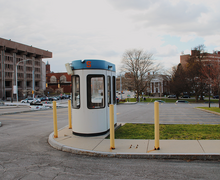Letter to the Editor : College admissions should look beyond superficial markers of success
Monday’s Daily Orange editorial poses a false choice between the quality and value of a Syracuse University education and a thoughtful admissions strategy that seeks to ensure diversity among the student body. Rather than devaluing the SU degree, diversity — in the classroom and on campus — makes college a richer and more productive learning experience for all, better preparing students for success in an increasingly complex and diverse world. The editorial mistakenly equates exclusivity with quality. Exclusivity enforced by selective admissions favors those in our society who are already advantaged. As an end in itself, selectivity does little to ensure high-quality educational experiences. My view is informed by my personal experiences as a student and 35 years of university teaching.
I worked on a factory assembly line after school while my high school friends from more fortunate families had time to do their homework and be tutored for their SATs. They often got better grades or higher SAT scores than did I. Many of them went on to Ivy League and other exclusive schools. I did not. I applied to SU, but I was not admitted. I went to a less selective college.
I spent my winter, spring and summer breaks at the factory, not traveling with friends to Mexico or Europe. But I worked hard at my schoolwork; and because some of my professors were especially supportive, I did well enough to go to graduate school, though not well enough to get into a ‘top-tier’ graduate program. SU rejected me for doctoral studies, too.
By the age of 25, I had completed my Ph.D. at the State University of New York Binghamton (then considered a second- or third-tier school). Despite not being from a prestigious school, the education I got was outstanding, and I learned skills for teaching, research and publishing that many of my colleagues who went to more prestigious schools did not learn. Working through college and graduate school introduced me to worlds I would not otherwise have seen or experienced, and this enriched, too, my own educational experience. My experiences in the classroom and outside have enabled me to achieve much.
The experience of being an outsider to academic selectivity and my anthropological work in a wide variety of communities — especially on racial and ethnic health disparities in Syracuse — showed me how important it is to meet people on their own terms and to look beyond superficial markers of success. Thus I much prefer university admissions policies, like ours at SU, that seek to create a student body composed of individuals who differ substantially from one another yet share a seriousness of educational purpose.
But diversity is not an end in itself. Rather, the careful construction of a diverse student body enhances the educational experience of everyone on campus. Before joining the SU faculty, I taught at both highly selective schools and at less prestigious schools. I’ve found that selectivity too often comes along with limited insight into the many alternative ways that people create meaningful lives. Selectivity created by a singular focus on SAT scores and similar measures results in classrooms and campuses where a limited range of points of view and ways of engaging the world are reproduced and alternatives dismissed without serious consideration.
I teach in the fields of peace and security studies, as well as in public health, and I often present classes with work on the causes and consequences of structural inequalities in societies around the world. When those classes are made up of students with similar backgrounds and experiences, many of whom have never met or surmounted the challenges of such structural obstacles, the students often find it hard to credit the alternate realities described in the works they read. But when the class contains students who have surmounted such challenges, the reality of those alternatives comes alive.
The reverse is true, too. When students who have surmounted structural challenges are in the classroom with those whose lives have been sheltered by privilege, new and promising ways of engaging the world open for them. In both cases, the differences of experience — social, cultural and geographic — in the classroom enrich the conversations and learning for all students.
The choice is not between quality and value on the one hand and diversity on the other in the SU experience. Indeed, when selectivity and exclusivity become ends in themselves, they easily become another way of saying that a school should only admit students who look and think like those already on the student body. By valorizing selectivity based on relatively superficial aspects of a student’s achievement in high school, rankings such as the U.S. News and World Report do a real disservice to all of us. I hope the SU community continues to admit students based on an appreciation of who they are and who they show they might become. This makes the university a better place at which to live, to work and to learn.
Robert Rubinstein
Professor of Anthropology and International Relations
Published on February 23, 2011 at 12:00 pm





